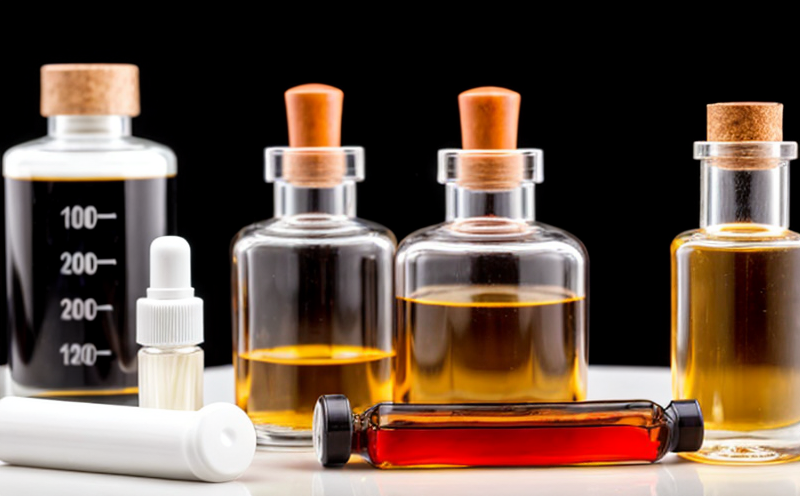Catheter Chemical Safety Testing
The safety of medical devices, including catheters, is paramount in ensuring patient well-being and adherence to international standards. This service ensures that all chemical components used in the manufacturing process do not pose a risk to patients or healthcare professionals during use. Here at Eurolab, we provide comprehensive testing services specifically tailored for catheter manufacturers aiming to comply with stringent regulatory requirements.
Our expertise lies in conducting detailed analyses of raw materials and finished products to identify potential chemical hazards such as leachable substances, allergens, and carcinogenic compounds. By leveraging advanced analytical techniques like GC-MS (Gas Chromatography-Mass Spectrometry), LC-MS/MS (Liquid Chromatography-Tandem Mass Spectrometry), and Fourier Transform Infrared Spectroscopy (FTIR), we can pinpoint even trace amounts of harmful chemicals.
Compliance with global standards such as ISO 10993-18, USP , and EU MDR is critical for manufacturers operating in competitive international markets. Our team works closely with clients to understand their unique needs and develop customized testing protocols that meet these stringent requirements.
Our state-of-the-art laboratory facilities equipped with cutting-edge instruments offer precise results which are essential for maintaining product integrity throughout the lifecycle of a catheter from design through production up until its end-of-life disposal. With our deep knowledge of regulatory frameworks, we help businesses navigate complex legal landscapes while ensuring they deliver safe products to market.
At Eurolab, our commitment extends beyond just providing test results; it encompasses supporting clients in making informed decisions based on the data generated during testing processes. This includes offering insights into areas where improvements can be made within supply chains or manufacturing processes that may impact overall product safety.
Scope and Methodology
The scope of catheter chemical safety testing involves evaluating various aspects of materials used in the construction of catheters to ensure they are free from harmful elements. This comprehensive approach covers multiple stages including raw material inspection, intermediate stage assessments, final product evaluation, and ongoing quality control checks.
| Stage | Description | Testing Methods |
|---|---|---|
| Raw Material Inspection | Evaluation of raw materials for purity levels and potential contaminants before incorporation into the catheter design. | GC-MS, FTIR, XRF (X-Ray Fluorescence) |
| Intermediate Stage Assessments | Monitoring during manufacturing process to ensure no unwanted chemicals are introduced. | Online Chromatography, Spectroscopic Analysis |
| Final Product Evaluation | Comprehensive analysis of completed catheter products for compliance with specified limits on allowable chemicals. | Liquid Chromatography-Tandem Mass Spectrometry (LC-MS/MS), Gas Chromatography-Mass Spectrometry (GC-MS) |
| Ongoing Quality Control Checks | Periodic reviews to maintain consistent quality levels over time. | Statistical Process Control, Monitoring of Key Performance Indicators (KPIs) |
We employ a multi-faceted approach combining both qualitative and quantitative methods tailored specifically for each stage mentioned above. Our goal is not only to detect issues but also provide actionable recommendations aimed at enhancing product safety without compromising performance.
Eurolab Advantages
At Eurolab, we pride ourselves on offering unparalleled service excellence backed by decades of experience in the medical device industry. Our team comprises highly qualified professionals who stay abreast of latest developments in regulatory requirements and scientific advancements relevant to catheter chemical safety testing.
- Comprehensive Expertise: With expertise spanning across numerous fields including analytical chemistry, toxicology, materials science, and regulatory affairs, our staff is uniquely positioned to provide tailored solutions for diverse client needs.
- State-of-the-Art Facilities: Our laboratories are equipped with industry-leading equipment capable of performing precise measurements down to parts per billion (ppb) levels ensuring reliable results every time.
- Regulatory Compliance Support: We assist clients navigate through complex regulatory landscapes by providing guidance on meeting specific criteria set forth by various governing bodies worldwide.
- Prompt Turnaround Times: Leveraging our efficient workflow management systems, we strive to deliver timely reports allowing businesses to quickly address any identified concerns and proceed confidently towards market release.
By choosing Eurolab for your catheter chemical safety testing needs, you can rest assured knowing that you are partnering with an organization committed to excellence in every aspect of our work.
Use Cases and Application Examples
Catheters represent one class among many medical devices where rigorous quality control measures must be implemented throughout the entire manufacturing process. By implementing comprehensive chemical safety testing, manufacturers can significantly reduce risks associated with adverse reactions experienced by patients using these products.
A prime example of this is a company developing a new type of catheter intended for use in critical care units. During development stages, they might utilize our services to ensure that all components are free from known allergens like formaldehyde or benzene which could potentially cause severe allergic responses if not properly managed during production.
Another case involves an established manufacturer who has been facing challenges meeting certain regulatory requirements due to changing standards over time. Our team helped them interpret those changes effectively and adjust their testing protocols accordingly so that they remain compliant without sacrificing product quality.
In both instances, our involvement ensured successful launches of new products into competitive markets while upholding high ethical standards regarding patient safety.





